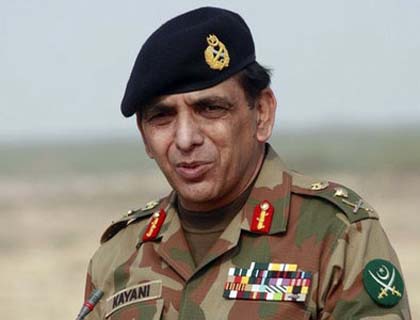ISLAMABAD/WASHINGTON - Pakistani Army chief General Ashfaq Parvez Kayani has warned that any future aggression will see the country responding 'with full force, regardless of the cost and consequences' as it emerged Friday that Pakistani officials, who were unaware of their soldiers being in the area, gave the green signal for the NATO airstrikes.
US officials said their Pakistani counterparts at a border coordination center gave the NATO forces the nod for the airstrikes, the Wall Street Journal reported.
The Nov 26 airstrikes on two Pakistani Army checkposts in Mohmand Agency killed two dozen soldiers, sparking outrage in Pakistan. Islamabad promptly barred the passage of NATO supplies through the country and decided to boycott the Bonn conference that would discuss the future course of action in Afghanistan.
In his first message to the troops after the NATO attack, the powerful army chief said Thursday that aggressors would not be able to evade a crushing retaliation in future.
The general permitted the soldiers to respond to any attack without waiting for directions from the high command, Dawn reported.
'Be assured that we will not let the aggressor walk away easily,' Kayani said.
The message said that he had 'clearly directed that any act of aggression will be responded with full force, regardless of the cost and consequences'.
The general's message was drafted to lift the morale of soldiers post the NATO airstrike.
Kayani said he was proud of his soldiers who responded with all the resources at their disposal, including artillery.
'We all salute the courage displayed by brave officers and men...'
The general was of the opinion the attack could have been effectively retaliated had the communications network not broken down.
'Timely decisions could not be taken due to breakdown of communication with the affected posts and therefore lack of clarity of situation at various levels, including corps HQ and GHQ,' the media report quoted Kayani as saying.
He made it clear that in case of another attack, the soldiers could respond on their own without waiting for orders from the top.
Kayani said he had 'full trust' in the capabilities and resolve of his men.
Recounting what happened on the night of Nov 26, WSJ Friday quoted US officials as saying that an Afghan-led assault force, including US commandos, was looking for Taliban guerrillas when they came under fire along the Afghan-Pakistan border.
The commandos thought that militants were firing at them, so they sought airstrikes against the encampment.
That request prompted contact with a joint border-control center to determine whether Pakistani forces were in the area, a US official said, according to WSJ.
The border-control center is operated by US, Afghan and Pakistani representatives and they are supposed to share information to avoid conflicts, the newspaper said.
The official said the center had not been told in advance about the commando operation.
The Pakistani representatives at the center said there were no Pakistani military forces in the area, and so the Americans went ahead with the airstrikes.
'There were lots of mistakes made...There was not good situational awareness to who was where and who was doing what,' the official was quoted as saying.
US officials said the Pakistani positions were more like makeshift camp sites than established military bases.
Also, since the Taliban and Pakistani Army use some of the same weaponry, it was difficult to tell who was firing at the assault force, the official added. (IANS)

